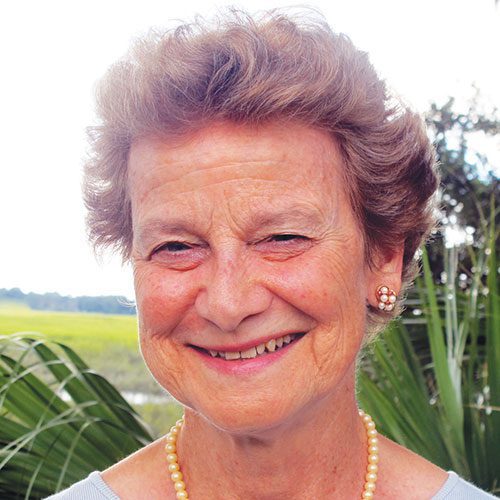What book or books are on your bedside table? Or in your reading nook? Or on your screened-in back porch to peruse over a morning cuppa joe or a glass of vino when the sun is over the yardarm? Or in the trusty book bag that travels with you wherever you go just in case a chunk of “found time” perfect for absorbing a few chapters might appear? Or on your phone at the ready for you to pop in your ear buds and listen for a bit of the latest from Audible or Hoopla? (Thank you, Beaufort County Library!)
My go-to books – whether currently to-be-read, too-good-to-return-to-the-bookcase-or-library-just-yet, or deep-in-scope-and-I’m-only-reading-bits-at-a-time-and-absorbing-what-I’ve-read-right-now – are in all of the above locations. Assuming it’s because I’m a writer, I’m asked frequently what I’m reading. Hearkening back to my days as a literary critic for the Lexington (KY) Herald Leader, for this column, I’m going to answer that question by perusing my stacks, bags, and phone.
Because this book is giving me reams of food for thought, growth, and good conversation, I’ll begin with The Untethered Soul: The Journey Beyond Yourself, by author, journalist, and motivational speaker Michael A. Singer. Certainly partially because Oprah discovered and recommended it, this book became a number one New York Times bestseller.
A quote from Deepak Chopra on the cover states, “Read this book carefully and you will get more than a glimpse of eternity.” It’s definitely not light reading.
Looking inside yourself is rarely easy, and that’s exactly where Singer leads the reader, as he walks you through your relationship with your thoughts and emotions, in particular, those that limit your consciousness. How do you think it would feel, he asks, to be completely free from limitations and soar beyond your own boundaries? What would you need to know and what steps would you need to take to make this sort of freedom and inner peace a reality?
A slice of practical food for thought from Michael Singer:
“You gain nothing by being bothered by life’s events. It doesn’t change the world; you just suffer. There’s always going to be something that can bother you, if you let it.”
Buckle your seat belt for a bumpy ride that can be completely transformative.
Next is Eckhart Tolle’s Practicing the Power of Now: Essential Teachings, Meditations, and Exercises from The Power of Now. This “condensed” version of Tolle’s The Power of Now: A Guide to Spiritual Enlightenment is a carefully arranged series of excerpts from his first book that include exercises and keys to achieving the “grace, ease, and lightness” that can come from quieting our thoughts and staying present.
An excerpt from Eckhart Tolle will give you the gist of this book’s depth: “You cannot forgive yourself or others as long as you derive your sense of self from the past. Only through accessing the power of the Now, which is your own power, can there be true forgiveness.”
Tough stuff, but it makes sense.
Practicing is small, easy-to-carry, and is a snap to pick up, open anywhere, and glean wisdom. Tolle is totally focused and no nonsense about the importance of living in the moment. Published in 1997, the original book was life-changing for yours truly.
The next book is one of my go-to’s when things change surprisingly quickly and catch me off-guard or when life itsownself gets topsy-turvy. Renowned artist, writer, and ultra-wise woman who penned The Artist’s Way, Julia Cameron also wrote the not-as-well-known volume, Transitions: Prayers and Declarations for a Changing Life, and it’s a treasure. In it she reminds her readers that while change can be difficult, accepting it is vital. The author helps us to back away from resisting change and to meet it head-on. Her offerings of innate wisdom can serve as a model for readers to begin to create personal healing prayers of their own and spiritual antidotes to the pain of anguished moments.
Especially helpful is an index listing the entries’ subject matter, i.e. clarity, compassion, optimism, relationship. For example, an entry on guidance ends with: “Today, with humility and openness I ask for spiritual intervention in my earthly affairs. I ask for help, and, in the asking, it appears.”
On a personal note, my copy of Transitions has my scribbles on the page margins, lots of highlighted text, pages turned down, and is literally dropping apart. Much used, obviously, not unlike my childhood copy of National Velvet!
It’s embarrassing how long off-and-on I’ve relied on Simple Abundance: A Daybook of Comfort and Joy, by Sarah Ban Breathnach. Upon first purchasing the book in 1995, I read it as the author likely intended, from cover to cover, January 1 to December 31. Now I pick it up when it calls to me.
Essentially, the book is organized as a stroll through the year, beginning in January with Ban Breathnach’s six principles of simple abundance: gratitude, simplicity, order, harmony, beauty, and joy. February’s focus is on identifying your authentic self, using those standards as a foundation, while the next months impart thoughts on finding that self daily – in the domestic arts, work, beauty, fashion, and pleasurable pursuits. Life. The authentic self, the author declares, is the “soul made visible.”
I recall that the following quote gave me peace the first time I read it: “The world needs dreamers and the world needs doers. But above all, the world needs dreamers that do. Don’t entrust your hopes and wishes to the stars. Today, begin learning the craft that will enable you to reach them.”
Talk about inspiring, especially to those of us whose right brains are a teeny bit dominant!
The last edition on my “spiritual growth” stack – and perhaps my favorite – is The Essential Rumi, translated by Coleman Bark. A 13th century Persian poet and Sufi mystic, Rumi came to Earth with a lot of knowledge about life, love, and the spirit, and wrote about it all in lovely, understandable language. English was not his first language, and Bark is considered his go-to translator. Rumi has been spoken of as the “most popular poet” and the “best-selling poet” in the United States.
Years ago, I first heard a Rumi quote while listening to Deepak Chopra, and the gorgeous words simply made sense to me: “Out beyond ideas of wrongdoing and rightdoing, there is a field. I’ll meet you there. When the soul lies down in that grass, the world is too full to talk about.”
Pollyanna here wants what Rumi talks about for the world. Today. Now. Read some Rumi and allow your ideas about the world and mankind begin to soften.
It’s never too late to start.








